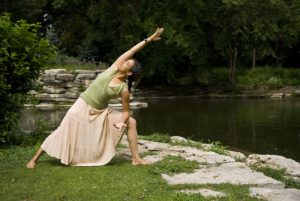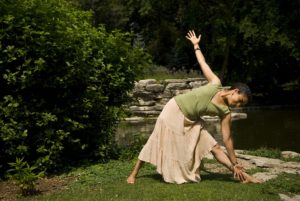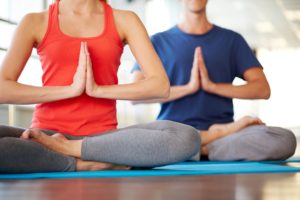
Many years ago I met a yoga teacher who said that “yoga is a feeling practice.” That resonated with me, and at the time I realized that I was only feeling my practice some of the time. The rest of the time I was so involved with my thoughts that I was barely present with what my body was experiencing until my muscles started to protest.
On Thanksgiving this year I had the rare opportunity to spend the day alone and in silence. No talking. And the first thing I noticed was how much time and energy I spend thinking. So many words! Planning, contemplating, analyzing, theorizing, prognosticating about what other people might be thinking… On a silent retreat I wanted silence, but my mind had other ideas.
The endless rambling of the mind is easy to get caught up in, and for a lot of people, this constant spinning of the mind is what causes the bulk of their anxiety. Don’t get me wrong – we want the mind to be able to do the work it needs to do, but when it is just spinning in circles and causing anxiety, that is not effective.
The same thing can happen in our yoga practice. We may be moving our bodies, but our minds may be miles away in space or in time – or we may be judging ourselves. We end up doing the practice for its residual effects, missing out on the experience each pose can generate. Or, we move our bodies around with little regard for what the body is telling us it needs – we aren’t actually listening or collaborating with our bodies.

In any given moment, thinking is accompanied by our sensory experience. The physical body is a sensory instrument. Sights, sounds, smells, sensations on our skin, all this is happening at this very moment – even as you’re reading these words. Can you feel your fingers touching whatever they are now touching? What are you hearing at this moment? What are you smelling? What do you see with your actual eyes (versus your internal landscape)? What emotions arise as you pay attention to your senses?
On the yoga mat, while in a pose or even while resting, what do you experience with your sense of touch? What do you hear, see, smell, sense, feel? What is the immediate experience of now? How does it feel to be present here and now? Very often, when we come back to the present moment, we actually feel more relaxed, more “here.” When we quiet the endless rambling of the mind, we have a chance to experience what is actually ok in the present moment.
 If the mind really wants to get involved, you might occupy it with the question: “Is this pleasant or unpleasant?” or “What feels good about this pose?” Let the mind be in service to the experience rather than spiraling out with judgments, shoulds, associations, plans or other elements that aren’t directly related to the experience you’re having now. Of course that spiraling might still happen, and you have the choice to follow, or to do something different. Instead of jumping on the “thought train,” you could acknowledge the mind, give thanks that it can do what it does, and then gently direct your attention back to the sensory experience of the moment.
If the mind really wants to get involved, you might occupy it with the question: “Is this pleasant or unpleasant?” or “What feels good about this pose?” Let the mind be in service to the experience rather than spiraling out with judgments, shoulds, associations, plans or other elements that aren’t directly related to the experience you’re having now. Of course that spiraling might still happen, and you have the choice to follow, or to do something different. Instead of jumping on the “thought train,” you could acknowledge the mind, give thanks that it can do what it does, and then gently direct your attention back to the sensory experience of the moment.
Who knows? You may begin to notice that your yoga practice actually feels good. Before you know it, you might find yourself smiling or even laughing on your mat. (Yes, that’s allowed!)
Namaste.
Gratitude practice helps connect the mind and body. The introspection might be difficult at first, maybe frightening, but the payoff is fantastic.
Hi Isabel! You’re so right.
thanks for gentle reminder to embody my practice!
Hi Candy! You’re welcome!!
I definitely feel my yoga. You’re right about not letting your mind be miles away. I often remind myself to give permission to let my mind rest and to allow the breathing to take over. The result is an ultimate restorative clarity.
Yes to resting the mind! I’m always amazed when I imagine my brain relaxing that relief actually happens in my head. LOL. It’s crazy how much our thinking mind is working all the time.
Yes, although I don’t have a yoga practice, I appreciate the reminder to be present to all aspects of feeling in whatever movement or stillness I am in (and to notice the stillness in the movement)
Lois, I love that – noticing the stillness in the movement. Mmm.
Francine, This wonderful guide on sensing into our asana practice and our practice of life encourages Santosha–for me a wellspring of healing.
With gratitude and a wide smile, Susan Rosenfield
You’re so welcome Susan! Smiling widely back =D